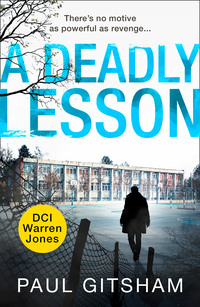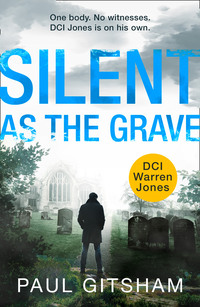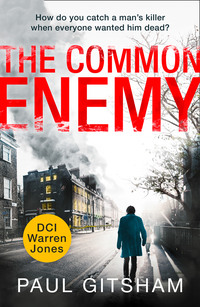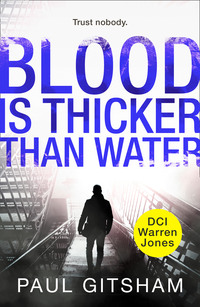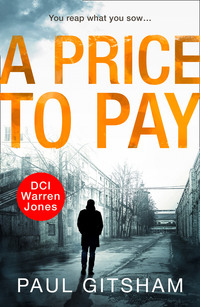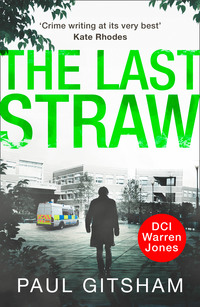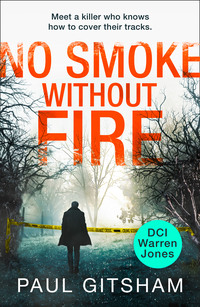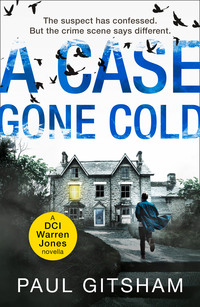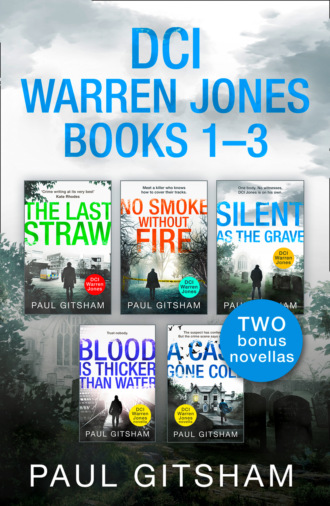
Полная версия
The DCI Warren Jones Series Books 1–3

PAUL GITSHAM started his career as a biologist working in the UK and Canada. After stints as the world’s most over-qualified receptionist and a spell ensuring that international terrorists hadn’t opened a Child's Savings Account at a major UK bank (a job even duller than working reception) he retrained as a Science Teacher.
Also by Paul Gitsham
The Last Straw
No Smoke Without Fire
Blood is Thicker Than Water (A DCI Warren Jones novella)
Silent as the Grave
A Case Gone Cold (A DCI Warren Jones novella)
The Common Enemy
A Deadly Lesson (A DCI Warren Jones novella)
Forgive Me Father
At First Glance (A DCI Warren Jones novella)
A Price to Pay
The DCI Warren Jones Series Books 1–3
The Last Straw
No Smoke Without Fire
Blood is Thicker than Water (A DCI Warren Jones novella)
Silent as the Grave
A Case Gone Cold (A DCI Warren Jones novella)
Paul Gitsham

Copyright

An imprint of HarperCollins Publishers Ltd.
1 London Bridge Street
London SE1 9GF
Omnibus edition first published in Great Britain by HQ in 2020
The Last Straw first published in Great Britain by HQ in 2014
No Smoke Without Fire first published in Great Britain by HQ in 2014
Blood is Thicker Than Water first published in Great Britain by HQ in 2015
Silent as the Grave first published in Great Britain by HQ in 2015
A Case Gone Cold first published in Great Britain by HQ in 2018
Copyright © Paul Gitsham 2020
Paul Gitsham asserts the moral right to be identified as the author of this work.
A catalogue record for this book is available from the British Library.
This novel is entirely a work of fiction. The names, characters and incidents portrayed in it are the work of the author’s imagination. Any resemblance to actual persons, living or dead, events or localities is entirely coincidental.
All rights reserved under International and Pan-American Copyright Conventions. By payment of the required fees, you have been granted the non-exclusive, non-transferable right to access and read the text of this e-book on-screen. No part of this text may be reproduced, transmitted, downloaded, decompiled, reverse engineered, or stored in or introduced into any information storage and retrieval system, in any form or by any means, whether electronic or mechanical, now known or hereinafter invented, without the express written permission of HarperCollins.
Ebook Edition © September 2020 ISBN: 9780008443252
Note to Readers
This ebook contains the following accessibility features which, if supported by your device, can be accessed via your ereader/accessibility settings:
Change of font size and line height
Change of background and font colours
Change of font
Change justification
Text to speech
Table of Contents
Cover
About the Author
Booklist
Title Page
Copyright
Note to Readers
The Last Straw
Dedication
Disclaimer
Prologue
Friday
Chapter One
Saturday
Chapter Two
Chapter Three
Chapter Four
Chapter Five
Chapter Six
Chapter Seven
Chapter Eight
Chapter Nine
Chapter Ten
Chapter Eleven
Chapter Twelve
Chapter Thirteen
Sunday
Chapter Fourteen
Chapter Fifteen
Chapter Sixteen
Chapter Seventeen
Chapter Eighteen
Monday
Chapter Nineteen
Chapter Twenty
Chapter Twenty-One
Chapter Twenty-Two
Chapter Twenty-Three
Chapter Twenty-Four
Tuesday
Chapter Twenty-Five
Chapter Twenty-Six
Chapter Twenty-Seven
Chapter Twenty-Eight
Wednesday
Chapter Twenty-Nine
Chapter Thirty
Chapter Thirty-One
Chapter Thirty-Two
Chapter Thirty-Three
Chapter Thirty-Four
Chapter Thirty-Five
Chapter Thirty-Six
Chapter Thirty-Seven
Thursday
Chapter Thirty-Eight
Chapter Thirty-Nine
Chapter Forty
Chapter Forty-One
Chapter Forty-Two
Chapter Forty-Three
Chapter Forty-Four
Chapter Forty-Five
Chapter Forty-Six
Chapter Forty-Seven
Friday
Chapter Forty-Eight
Chapter Forty-Nine
Chapter Fifty
Chapter Fifty-One
Chapter Fifty-Two
Chapter Fifty-Three
Chapter Fifty-Four
Chapter Fifty-Five
Chapter Fifty-Six
Epilogue
Acknowledgements
No Smoke Without Fire
Dedication
Prologue
Chapter 1
Chapter 2
Chapter 3
Chapter 4
Chapter 5
Chapter 6
Chapter 7
Chapter 8
Chapter 9
Chapter 10
Chapter 11
Chapter 12
Chapter 13
Chapter 14
Chapter 15
Chapter 16
Chapter 17
Chapter 18
Chapter 19
Chapter 20
Chapter 21
Chapter 22
Chapter 23
Chapter 24
Chapter 25
Chapter 26
Chapter 27
Chapter 28
Chapter 29
Chapter 30
Chapter 31
Chapter 32
Chapter 33
Chapter 34
Chapter 35
Chapter 36
Chapter 37
Chapter 38
Chapter 39
Chapter 40
Chapter 41
Chapter 42
Chapter 43
Chapter 44
Chapter 45
Chapter 46
Chapter 47
Chapter 48
Chapter 49
Chapter 50
Chapter 51
Chapter 52
Chapter 53
Chapter 54
Chapter 55
Chapter 56
Chapter 57
Chapter 58
Chapter 59
Chapter 60
Chapter 61
Chapter 62
Chapter 63
Chapter 64
Chapter 65
Chapter 66
Chapter 67
Chapter 68
Chapter 69
Epilogue
Acknowledgements
Blood is Thicker than Water
Dedication
Blood is Thicker than Water
Acknowledgements
Silent as the Grave
Dedication
Prologue
Chapter 1
Chapter 2
Chapter 3
Chapter 4
Chapter 5
Chapter 6
Chapter 7
Chapter 8
Chapter 9
Chapter 10
Chapter 11
Chapter 12
Chapter 13
Chapter 14
Chapter 15
Chapter 16
Chapter 17
Chapter 18
Chapter 19
Chapter 20
Chapter 21
Chapter 22
Chapter 23
Chapter 24
Chapter 25
Chapter 26
Chapter 27
Chapter 28
Chapter 29
Chapter 30
Chapter 31
Chapter 32
Chapter 33
Chapter 34
Chapter 35
Chapter 36
Chapter 37
Chapter 38
Chapter 39
Chapter 40
Chapter 41
Chapter 42
Chapter 43
Chapter 44
Chapter 45
Chapter 46
Chapter 47
Chapter 48
Chapter 49
Chapter 50
Chapter 51
Chapter 52
Chapter 53
Chapter 54
Epilogue
Acknowledgements
A Case Gone Cold
Dedication
Prologue
Now
Six Months Later
Acknowledgements
About the Publisher
The Last Straw
Paul Gitsham
For Nana. You never got to read it, but I think you’d have enjoyed it.
Disclaimer:
The town of Middlesbury, the University of Middle England, Middlesbury CID and all characters featured in this book are entirely fictional and not intended to represent any real-world individuals or organisations. It is also important to stress that whilst Hertfordshire and Bedfordshire Constabularies are real organisations, they are not in any way affiliated to this book and my depiction of them and their officers are entirely imaginary. I have only the deepest respect for what they do.
Prologue
Blood.
Everywhere. Across the walls, over the desk, even splattered on the glowing laptop computer. The human heart is a powerful, muscular pump and a cut artery bleeds out in seconds, spraying red, freshly oxygenated blood across the room like a fire hose.
Tom Spencer removes his gloved hands from the dead man’s throat and rubs them down the front of his lab coat, leaving bloody trails across his chest. Hands shaking, he picks up the blood-covered telephone and presses 9 for an outside line, followed by another three 9s.
“You are through to the emergency services. Which service do you require?”
Spencer’s voice is shaky, his breathing rapid. “Police. There’s been a murder.”
Chapter 1
Detective Chief Inspector Warren Jones slid to a halt with a faint squeak of tyres outside the main entrance to the University of Middle England’s Department for Biological Sciences. Fifteen minutes had elapsed since he’d received the call and he doubted he could have done it much faster with blue lights and sirens. He switched off the engine and the sat nav on the dashboard beeped then went silent.
Two weeks into this new posting and the freshly promoted DCI was still reliant on the little device to get him around his new patch: the small Hertfordshire market town of Middlesbury. By driving everywhere with the device in map mode and where possible leaving for appointments early to take the most circuitous route, he was slowly building up a mental map of the local area. Although it was costing him a fortune in petrol — he felt guilty about passing on that cost to the force — it was the best way he knew to learn his way around.
The call could have been better timed, he supposed. He’d just finished pouring a bottle of Chilean red and was in the process of toasting his mother-in-law’s upcoming birthday when his mobile had rung. The temperature in the freshly decorated lounge had dropped precipitously. Bernice had never been impressed that her eldest daughter, Susan, had married a police officer — feeling that she and her monosyllabic, hen-pecked husband, Dennis, had raised their children to aspire to greater things. Private education and all the accoutrements of a wealthy middle-class upbringing in the leafiest part of Warwickshire had led Bernice to expect her daughters to marry well. That being said, she grudgingly acknowledged that Warren was a nice enough man and at least he was a Catholic.
Mumbling his apologies, he’d slipped on a jacket and left the house as quickly as possible.
Now that he was here, the familiar singing in the blood had started, mixed with a tightness in his gut. He took a few deep breaths to steady himself, whilst rummaging around for a breath mint. He’d only had a sip of the wine, and had abstained completely at the restaurant so that he could drive, but the last thing he wanted was for somebody to smell alcohol on his breath. Not on his first big case. A murder. This was what he’d joined the force for; even more importantly what he’d trained as a detective for. For the past fortnight, he’d overseen his small team as they dealt with the endless tide of robberies, burglaries and low-level violence that plagued any society — a job that he was proud to do and that he knew was important to the public. But a murder was different. A murder was what got you known. A murder could make your career. It could also ruin your career before it really started...
Clambering out of the car into the hot, breathless, summer night, he scanned the largely deserted car park. Adjacent to the entrance an ambulance was parked up next to two police cars. At the other end of the car park a silver BMW sports car sat alone in the dark The ambulance’s blue lights were off, but the rear doors were open, light spilling out into the night, throwing shadows across the thick black tarmac. The paramedics stood by, chatting and smoking, relaxed, not expecting to have to do anything for a while. According to the call that Warren had received, the victim was beyond their help and they were now little more than a glorified taxi service to the morgue.
The front of the building was mostly glass, with two large, sliding doors leading into a well-lit reception area. As Jones strode briskly towards the building a young, uniformed police constable with a clipboard stepped out of the dark shadows to the side of the entrance.
“I’m sorry, sir, I’m afraid I can’t let anybody enter the building at the moment.”
Jones reached inside his jacket for his warrant card. “DCI Jones.” Where the hell was his wallet? Bugger! He’d been in such a rush to leave, he’d grabbed the nearest suit jacket to hand. Unfortunately, it wasn’t the one he’d been wearing to the office during the week and so the pockets were empty.
The young constable clearly didn’t recognise either him or his name. Not for the first time, Jones regretted his forgettable surname. The PC flushed a little, clearly realising there was no way out of this awkward impasse without loss of dignity for one or both of the two men.
Fortunately, or unfortunately, the day was saved by a booming Essex voice.
“Don’t you recognise the new boss, lad?” Jones suppressed a sigh. Great, his first big case and the DI first on the scene had to be Tony Sutton, the man who many believed should be the one wearing three Bath Stars on the epaulettes of his dress uniform, rather than this outsider, parachuted in from the West Midlands Police to clean up their mess.
Turning, he saw Sutton walking towards them, a barely concealed smirk on his face. Like Jones, he was dressed in a smart suit, although he wasn’t wearing a tie. But there the similarities ended. Where Jones was a slim six feet one inch, Sutton was a short, squat bear of a man, his pugnacious features and crooked nose a reminder of his days on the force’s rugby team. He was six years older than Jones, and most observers had expected him to be promoted when the previous DCI, Gavin Sheehy, retired. Unfortunately, Sheehy hadn’t made it to retirement and although Sutton had been fully cleared of any involvement in Sheehy’s disgrace he was nevertheless seen — rumour had it — to be too close to the shamed detective to be given such an important role. At least not yet. Hence Warren’s sudden and unexpected appointment.
“Sorry, sir.” The young lad was blushing now.
Jones patted him on the shoulder encouragingly. “Never apologise for doing your job, son.”
Son? Bloody hell, when did I get so old that I call twenty-year-old constables ‘son’? thought Warren.
Putting aside his discomfort, Jones walked to join Sutton, who led them through the front doors into the lobby. Inside was a large reception desk with a computer and a bank of telephones, behind a reinforced glass screen, rather like a bank teller. To the right of the desk two large double doors were held open by another uniformed PC. A swipe-card lock flashed red and an angry-sounding electronic alarm buzzed insistently, no doubt triggered by the door being held open so long.
“What have we got, Tony?”
“Nasty one, guv. White middle-aged man, identified as a Professor Alan Tunbridge, throat slit right open and head bashed in, sitting in his office.”
Sutton led Jones up a flight of stairs to the right of the entrance, before proceeding along a wide open corridor deeper into the building.
“Who found the body?”
“A young man named Tom Spencer, apparently one of the late professor’s students. Claims he was working late, came back to the lab and noticed the prof’s office door was open and the lights on. Figured he’d pop his head round and say ‘Hi’. Found him in his chair, blood everywhere. Reckons he took his pulse but couldn’t find anything, then phoned 999 on the office phone.”
“What state is the crime scene in?”
“Untouched, except by Spencer. Two uniforms were first to respond and were let in by campus Security. They took one look and figured there was nothing they could do for him. Paramedics arrived a few minutes later and agreed, pronounced him dead at the scene, probably from loss of blood. Yours truly arrived just after the paramedics. Scenes of Crime are on their way.”
At the end of the corridor, Jones and Sutton turned a corner. “Here it is,” said Sutton somewhat unnecessarily.
The corridor was crowded; two pale-looking uniformed constables were standing guard either side of an open office door. A couple of middle-aged men wearing blue woollen jumpers with ‘Security’ stitched in white writing on the left of the chest leant against the opposite wall, looking decidedly shaken. Standing awkwardly, answering questions to a uniformed sergeant, and looking like the demon barber of Fleet Street, stood a young man in a blood-stained white lab coat. His hands were covered in white latex gloves, also smeared with blood. A surgical face mask, rather like the ones worn by carpenters or DIY enthusiasts, hung on an elastic band around his chin. His shoes were blood spattered and crimson footprints led from the open office door to him.
Slipping his hands into his pockets and moving as close to the door as he could without stepping in any blood, Jones peered into the office and almost wished he hadn’t.
As a detective with many years of experience, Jones was used to the sight of blood, of course. But this broke new ground. It looked as if every last millilitre of the life-giving red liquid had been forcibly ejected from the man’s body. The pasty, greyish-blue tint of the corpse’s skin confirmed the observation. He could see why the responding officers hadn’t felt the need to contaminate the scene by checking his pulse. The Scenes of Crime team would have to check with the paramedics to see if they had touched the body.
The late professor had been a man in his fifties, with a shock of grey, unruly hair. About average height and weight for a man of his age, he was clad in brown corduroy trousers and a white polo shirt. That was about all that Jones could make out amidst the blood. The man was slumped to one side in a comfortable-looking padded leather office chair, pointed halfway towards the office’s only door. The seat was a swivel chair, positioned so that the occupant could easily operate the laptop, answer the phone and reach the various pieces of paper that were piled carelessly on the remaining surface of the desk. A selection of different-coloured ballpoint pens was scattered across the workspace. A clear area to the right of the laptop suggested a space for a mouse.
The professor’s throat had been slit, clearly by something very sharp. Whoever had wielded the blade had done so efficiently. It looked to Jones’ eye as if the blade had managed to sever both carotid arteries. If that was the case, it put a different complexion on the attack. Contrary to Hollywood movies, cutting the throat of a surprised man wasn’t a simple affair. The victim would almost certainly have struggled. Looking closer, Jones could see that, aside from the cut throat, the back of the professor’s head — facing away from the doorway — looked to be a bloody mess. On the floor next to the chair sat what appeared to be a large lump of granite rock on a pedestal, blood and matted hair covering a particularly prominent edge. Jones could just make out the words “Boulder, Colorado” stencilled on the base. A souvenir perhaps? Significant or not?
Jones turned to Sutton.
“First impressions, Inspector?” he asked quietly. Jones was already formulating a theory himself, but he liked to see what others had to say first.
“I reckon he was sitting at the desk, probably working on his laptop by the looks of it. Whoever did it came up behind him and whacked him over the back of the head with that bloody great lump of rock. That probably stunned him enough for his attacker to slit his throat.”
Jones nodded. “The question is, why didn’t he turn around? It looks as though he was facing away from the doorway when he was hit. And then, did his chair turn around after he was hit or whilst his throat was being slit?”
“Well, either the attacker sneaked up on him, or he knew his attacker was around and wasn’t surprised by their approach.”
Jones nodded his agreement.
“And what about the angle of his chair?”
“Too early to speculate.”
“I agree, let’s not second-guess Scenes of Crime.” Jones was pleased with Sutton’s response. He was always a little wary of officers who jumped to conclusions without all of the facts. Good detectives, he felt, tempered their deductive reasoning with caution and were honest enough to admit ignorance, rather than stretching the evidence beyond breaking point.


